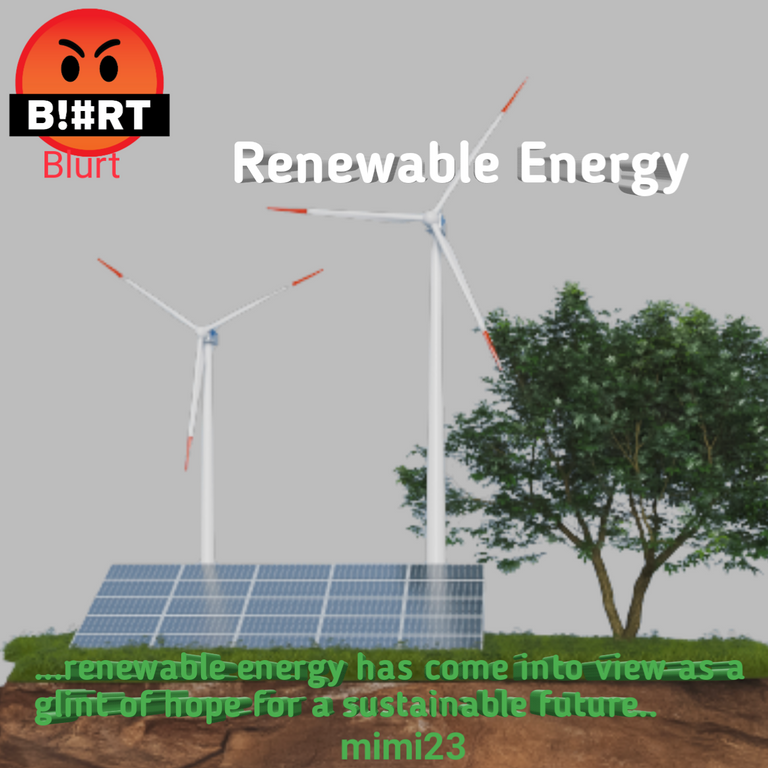


In a time where environmental concerns are of great importance and the consumption of fossil fuel reserves is happening rapidly, renewable energy has come into view as a glint of hope for a sustainable future.

Renewable energy technologies have obtained acknowledgement with the ability to reduce carbon monoxide in form of carbon emissions and battle climate changes, thereby offering a constant and clean sources of power.
This essay range over the significance, types, benefits, and obstacles related to renewable energy, highlighting its transformative effect on the global energy scene.
Renewable energy, majorly known as clean or green energy, is obtained from natural processes that are constantly refiiled Unlike fossil fuels, which have limited reserves and put up to pollution and climate change, renewable sources are practically limitless and have minimal impact on the environment.

The primary sources of renewable energy are: biomass, solar, wind, hydroelectric, geothermal.
The solar energy ( energy from the sun) which uses the power from sun through the medium of photovoltaic cells, it converts the sun power into electricity. The much availability of sunlight make solar energy a better option in many regions thereby encouraging self sufficiency energy and reducing the reliance on fossil fuels.

Comparably the wind energy use the energy produce by the wind turbines to bring about electricity by using the kinetic energy of moving air. Due to it's adaptability,it's gain and low green house gas emissions, has lead to the increase of wind power.
Hydroelectric power, which is inacted by water flowing through dams and turbines, has been in use for decades and continues to be notable contributor to global electricity production. This form of renewable energy makes available reliable baseload power and contributes to flood control and water management.

Geothermal energy taps into the Earth's internal heat, putting to use steam and hot water reservoirs beneath the surface to generate electricity or provide direct heating. Lastly, biomass energy employ organic materials such as wood, agricultural residues, and waste to produce heat or electricity, reducing waste and contributing to sustainable waste management.

The benefits of renewable encircle the societal,environmental and economic advantages.
Firstly, by putting to use energy sources that do not drain, renewable energy reduces the strain on finite fossil fuel reserves, thereby promoting energy security.
Reducing the after effects of climate change and air pollution, this transition also restrain greenhouse gas emissions. Additionally, the stimulation of local economies and the encouragement of innovation in technology and infrastructure are realized by renewable energy systems, which promote jobs in manufacturing, installation, operation, and maintenance.

Nevertheless, the acquisition of renewable energy does come with its confrontations. One major barrier is erracticism caused by weather conditions, which leads to fluctuations in power output due to the inconsistent availability of renewable energy sources. Consequently, the development of efficient energy storage solutions, like advanced batteries, becomes important to store excess energy during peak generation periods( during the avaliablity of enough sun) for use during low-production periods( non availability of enough sun). Encouraging the acquisition of renewable energy into existing grids requires substantial investment and robust policy frameworks.

Moreover, the commencing capital cost of fixing renewable energy systems can be higher than that of traditional fossil fuel-based infrastructure, although their durable operational costs are generally low. Not withstanding, some regions or nations may be dejected from embracing these technologies.

However, alleviating these financial hurdle and encouraging the growth of renewable energy markets have been made possible through government inducement, tax breaks, and subsidies.

In conclusion, renewable energy presents an encouraging solution to discuss the pressing opposition of climate change, resource depletion, and energy security. It modifies the way we generate and consume energy, thanks to its manifold range of sources that offer both technological and environmental relevant benefits.

As the world continues to undergo the transformation towards cleaner and more sustainable energy systems, consorting between governments, industries, and communities becomes very important to overcome the defiance and unlock the full dormant of renewable energy.
Through joint effort and innovation, humanity can guide in an era of energy opulence while also defending the future generations for the planet.